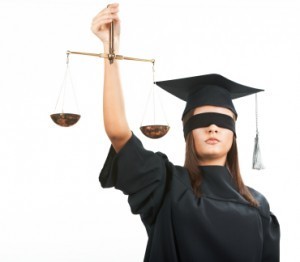Seat Twelve People in a Room, and What Do We Get? A Verdict You Might Not Like.
 Last week before the Casey Anthony verdict, I sat in a room at George Washington University and listened to a group of law students argue a case. Since I'm friends with one of the law professors, I've done this before, perhaps half a dozen times.
Last week before the Casey Anthony verdict, I sat in a room at George Washington University and listened to a group of law students argue a case. Since I'm friends with one of the law professors, I've done this before, perhaps half a dozen times.
Any given night during moot court sessions, there might be six trials in session, all trying exactly the same case. It's quite an achievement to find enough volunteers to make the process work, so our jury had only four members.
I've never been on a real jury, although I've been on voter rolls since 1970. I'm envious of my friend, the author Karen Young who served an entire year on a state grand jury and has stories to tell about it. I joke about my FBI file. Have they inadvertently mixed me up with another Emilie? Do I have a ringer on a watchlist? I did protest in front of my university administration building as a sophomore. Hmmm. . .
Without real experience, I've been delighted to take part in moot court. Some of the law students are naturals, some need work, some of the defendants and witnesses should consider theater as a major. Last week was the first time, however, that we tried a case of sexual assault.
In previous cases I've been interested in my own reaction. While I'm usually a person who tries to weigh both sides of any issue, I really don't want to hear "why" somebody might have committed a crime or what will happen if he's thrown under the calaboose. I want the facts, ma'am. Did he or didn't she? Show me the proof, and I'll convict without worrying about the wife who will have to fend for herself or the library where our suspect volunteers every Wednesday. But if there's reasonable doubt? Watch out. If a prosecutor can't make a case, then I can't say "guilty," no matter how likely it is that the defendant did indeed try to run down his mother-in-law after she served him greasy pork chops.
This had been true until the case was sexual assault.
The cases the GW law students try are based on real events, with many details altered and rewritten. By the time we hear them, they're almost entirely fiction. In this one, a young pregnant waitress walks home late at night after getting off work early because she's not feeling well. Halfway there, she's accosted by a customer she just served–and doesn't remember–escorted into his car at knife point and eventually raped. At night's end she's deposited back where the nightmare began and allowed to finish her walk home.
I wanted the defendant to fry. Our victim was lovely, young, sweet as her diner's apple pie. Her husband was madly in love, poor but hardworking. Wow. Does a happily married woman expecting her first child and experiencing morning sickeness (at midnight) really offer herself to a stranger she meets in the diner, then beat herself up so she can use rape as an excuse because she's late coming home? Did it matter to me that the police detective did not test the DNA from the rape kit? Not when both of them agreed the sex had happened. This was not, remember, an episode of CSI.
How often is a sexual assault witnessed by credible people who can testify to what they've seen? Most of these cases have to be, by nature, circumstantial. So at what point must we rely on indirect evidence and convict a rapist or a mother who murders a child? At what point are our doubts reasonable and at what point absurd?
Our jury of four hung. By the end of our deliberations three of us agreed that the defendant was guilty. The fourth was certain from the moment we put our heads together, that he was not. She thought the investigation should have gone deeper, even though most of the facts were not in dispute.
In fairness to our hold-out, every other jury that night brought in a verdict of not guilty.
I thought about that mock trial when I learned yesterday that Casey Anthony will go free. I thought about my own reaction and sympathy for the moot court victim. About the fact that only rarely does a prosecutor have a credible witness who can point a finger and say "I was there and I saw her do it." I thought about how much rides on the supposed sincerity of the defendant or accuser, the quality of the lawyers and prosecutors. The good ones win their cases, even if the cases have holes.
Our justice system isn't always fair. Poor defendants are sometimes assigned great public defenders, and sometimes they're assigned recently graduated law students who never won in moot court, either. High profile cases attract fabulously inventive lawyers, who frequently win cases that looked bullet proof because they coin catchy slogans or artfully muddy the waters. Jury pools who watch too much television can't understand that underfunded police departments must pick and choose what and whom to pursue and spend taxpayer money wisely.
Our justice system isn't always fair. It is, however, pretty darned amazing. Casey Anthony will go free because twelve of her peers looked at all the evidence, perhaps thought she is guilty as sin, and still voted not guilty. Because not guilty was, in their minds, the only legitimate choice. For them the case wasn't made. Reasonable doubt existed. And in the background, the death penalty loomed. We may not agree, but in this country? Thank God we're allowed that privilege.



